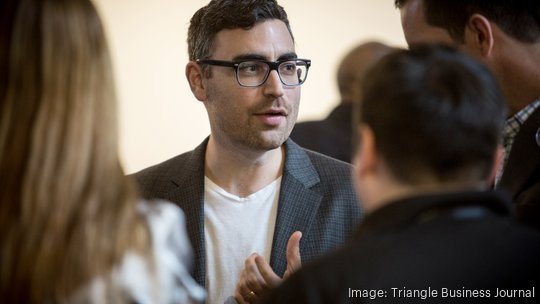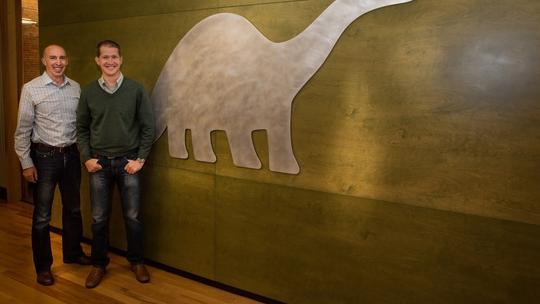
As Triangle startups mature and exit, the idea of ecosystem is strengthening, with a slew of serial entrepreneurs taking the pay-it-forward mantra seriously.
Startup Green Places – which, through its technology is looking to be the "chief sustainability officer" for small businesses – officially launched this month and, according to CEO Alex Lassiter, has been “floored with support” from business owners looking to reduce their carbon footprint.
But it’s the combined support of a group of serial entrepreneurs a few weeks ago that really made the launch possible.
Names familiar to the Triangle startup scene – Jesse Lipson, Scot Wingo, Joe Colopy, Chaz Felix, Todd Olson and Kyle Porter – have funneled in their dollars, taking big bets on the venture’s success with a $1 million funder.
Lipson, whose previous startup, Sharefile, sold to Citrix (solidifying the company’s continued presence in downtown Raleigh), led the latest round. He had discussed the company's concept with Lassiter prior to its incorporation.
“We wanted to help our companies become carbon neutral, but the process was just too confusing and difficult,” he said. “So when Alex decided to found Green Places, I joined on as the lead investor and board member.”

Wingo, co-founder of ChannelAdvisor (NYSE: ECOM) and current operator of Get Spiffy, got to know Lassiter before making a minority investment.
“When Alex told me his idea and asked if businesses would need it – I not only said ‘yes,’ but ‘yes and WE need it ASAP,” he said in an email. “Here you have a great, 2.0 serial entrepreneur plus a great idea – it’s a no-brainer to invest in that.”
Serial entrepreneur Joe Colopy, too, pointed to Lassiter’s chops as a serial entrepreneur.
“Alex is an all-star serial entrepreneur,” Colopy said. “He had a great run at his previous venture, Gather in Atlanta, and I expect to see even better things with this one.”
Colopy and Felix, co-founders of Bronto, which sold to Netsuite (and later to Oracle) joined in as minority investors, as did customers-turned investors Olson, the CEO of Pendo and Porter, the CEO of SalesLoft.

All had successful ventures, and all wanted to pay their success forward – as well as to invest in a business concept they believe in.
For Green Places, the support of local, big name backers was worth more than dollars, Lassiter said.
“What they do is they provide operational experience,” he said. “They’re able to hop on a late night call to talk me through ideas and challenges.”
They also make connections. Lipson and Felix, for example, “re-introduced” Colopy to Lassiter a few months ago, leading to his investment.
And the fact that they’re local makes Lassiter “feel like we’re a part of something bigger, really helping to push the community forward.”
For local startup insiders, the idea of serial entrepreneurs funneling their dollars and expertise into the next generation of startups is a big deal.
“I think successful entrepreneurs investing in new businesses is a big sign of maturity for our entrepreneurial ecosystem,” said Lister Delgado, managing partner for Idea Fund Partnesr. “This is what you see frequently in other mature and successful ecosystems.”
Paying it back
Several of the area’s most prolific investors started as entrepreneurs themselves.
David Gardner went from being one of the entrepreneurs behind PeopleClick to the founder of Cofounders Capital in Cary, making a slew of angel investments along the way.
Colopy founded Jurassic Ventures to have a vehicle to fuel startups following his exit with Bronto.
Cindy Eckert, co-founder of one of the area’s biggest pharma exits, Sprout, used some of her earnings from the deal to create entrepreneurial investment and support firm The Pink Ceiling.
And those are just three examples. Jason Caplain, co-founder of Bull City Venture Partners, was working in the finance group at Red Hat (NYSE: IBM) when it went public in 1999. Bob Ingram, one of the partners at life sciences investor Hatteras Venture Partners, made waves in the region as the former site lead for what was then Glaxo/Welcome, now GlaxoSmithKline. And John Replogle, a co-founder of One Better Ventures in Raleigh, formerly led natural cleaner company Seventh Generation.
And there are many more cases of local executives and entrepreneurs getting in on the funding action.
As the region matures and more professionals find success, the list of those turning back around and investing in the entrepreneurial community that helped them succeed will only get longer.
Gardner said it’s an easy pivot for an entrepreneur, in particular, to make.
“Investors tend to invest in things they are comfortable with and understand, so serially successful startup entrepreneurs tend to invest in startups,” Gardner said. “They are comfortable with the risks and unknowns so long as they believe the leadership team has the skills and a process to figure those unknowns out over time.”
And it’s good for the startup, as a serial entrepreneur has walked the walk, Gardner said.
“They bring experience, good advice, contacts and they tend to have deep pockets which are often needed to protect an investment,” he said.

And they also bring credibility, said Delgado. And that credibility “helps attract other dollars.”
“What you like to see is that these entrepreneurs invest because they see opportunity, not just because they want to pay it back,” Delgado said. “That is sustainable. It attracts other opportunities and it scales.”
Jumping on the bandwagon
The entrepreneurs-turned-backers behind Green Places gave TBJ advice for those wanting to dip their toes into startup investing in the Triangle.
Wingo said that angel investing is one of the highest risk – albeit highest reward – types of investments.
“It definitely isn’t for everyone,” he said. “You should be prepared to lose 100 percent of your principle investment.”
But there are positives, as you are supporting local startups and when these types of investments do make a hit, “they can hit big.”
“One way to manage this is through a portfolio approach (a basket of startups) – by investing in one of the local [venture capitalists] as a limited partner or building your own basket,” Wingo said in an email.
Lipson said his best advice is to “be present in the community and build relationships.”
“You never know where those relationships will lead and often angel investments arise out of a trusted relationship that has been built over time, “he said.